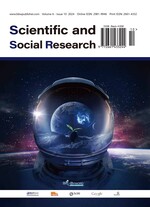Abstract
With the development of globalization, films and TV series from foreign countries, as an important vehicle of culture, have sprung up and are appreciated by viewers due to high-quality subtitle translation. Thus, subtitle translation has become an important part in the field of translation research. Since its launch in China, the famous American sitcom 2 Broke Girls has achieved universal praise among audiences. This recognition is attributed not only to its intriguing plot but also to the excellent subtitle translation, in which domestication and foreignization, two key translation techniques, play an important role. Although many scholars have already conducted research and discussions on domestication and foreignization, there is still a lack of studies on the application of these two techniques to this drama. Therefore, taking this sitcom as an example, through an analysis of domestication and foreignization methods and of the humorous elements in the drama, this paper explores the characteristics, advantages, and limitations of these two translation methods in their practical application in the drama, focusing on specific scenarios for research. It is found that domestication and foreignization play a crucial role in driving the plot forward and enhancing the comedic effect of this sitcom. In the process of translation, translators should combine these two translation strategies well to achieve a better effect.
References
Nida EA, 2001, Language and Culture: Contexts in Translating. Shanghai Foreign Language Education Press, Shanghai, 129.
Venuti L, 1995, The Translator’s Invisibility: A History of Translation. Routledge, New York, 20.
Zhao J, 2020, Skopos Theory and Subtitle Translation of Culture Loaded Words from the Perspective of Domestication and Foreignization: Taking China on the Tongue as an Example. Silk Road Vision, 2020(32): 38.
